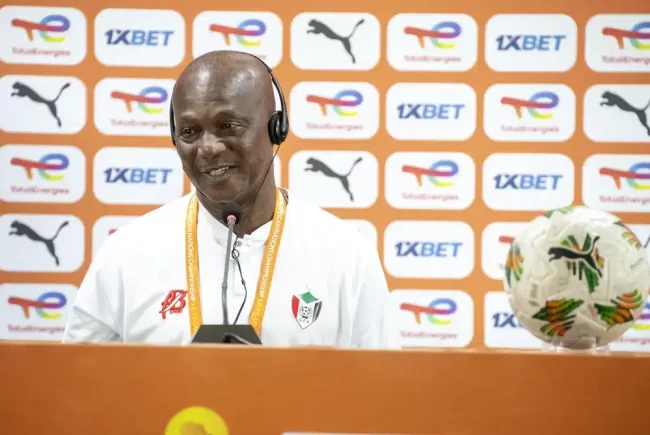CHAN 2024: Sudan coach Kwesi Appiah admits Madagascar deserved semi-final victory

Sudan’s hopes of reaching their first African Nations Championship (CHAN) final came to an end on Tuesday after a dramatic extra-time defeat to Madagascar.
Head coach James Kwesi Appiah accepted responsibility for the result and praised the opposition for their resilience.
The Falcons looked poised to capitalise when Madagascar were reduced to ten men, but despite the numerical advantage Sudan failed to convert their dominance into goals. Speaking after the 2-1 loss, Appiah acknowledged that Madagascar displayed greater composure and efficiency.
“Our opponent, Madagascar, played well and even with ten players they were excellent,” the Ghanaian coach admitted. “We had chances to win but were not clinical enough. At this level, you cannot afford to waste your opportunities.”
Sudan initially fought hard to control the game, yet a lack of sharpness in front of goal proved decisive. The side conceded an equaliser late in normal time before being undone in extra time. Reflecting on the match, Appiah stressed that tactical errors in the second half shifted the momentum away from his team.
“Tactically, the second half was not on our side,” he explained. “In football, when you get the one clear chance that can change everything, you have to take it. Unfortunately, we did not, and it cost us.”
The CHAN, unlike the Africa Cup of Nations, is restricted to footballers active in their domestic leagues. That limitation has posed a serious challenge for Sudan, whose domestic competition has been suspended for more than two years due to instability in the country. Appiah was frank about the impact this disruption has had on his squad.
“It’s a building process, and unfortunately, for two and a half years we have not had a league in Sudan,” he said. “The absence of regular competitive football is a huge disadvantage for our players. If stability returns and the league is resumed, the situation will improve and the national team will benefit. We must be patient but also determined to push forward.”
Despite the disappointment of missing out on the final, Appiah remains optimistic about the future of Sudanese football. He emphasised that the tournament had provided valuable competitive experience and showcased players capable of strengthening the senior national team.
“This competition has given us the opportunity to play matches that matter, to measure ourselves against strong opponents, and to remain competitive,” the coach added. “We now have four players who will step up to the senior squad for the Africa Cup of Nations. That is a positive sign that our work here will contribute directly to the future.”
Sudan’s elimination extends their wait for a maiden CHAN final appearance, but Appiah is convinced that with a stable domestic structure and continued development, the team will be better prepared in future tournaments.
“Football is a long-term project,” he concluded. “The talent is there, but we need the right environment for it to flourish. If we stay focused and disciplined, Sudan will achieve its goals.”
For Madagascar, the victory marked a historic moment as they advanced to the CHAN final, while Sudan are left to reflect on missed opportunities and the pressing need for a functioning domestic league to support their ambitions on the continental stage.












